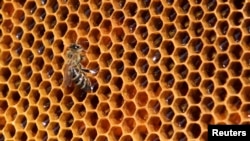The forests in eastern Zimbabwe supply the country with wood and most of its fresh fruit.
But the removal of large numbers of trees and use of fire to clear land have caused a lot of damage to the area.
Officials say Zimbabwe lost more than 1.5 million hectares of forest in 2016. This is mostly because of local communities cutting the trees for firewood or setting fires in forested areas to make hunting easier.
But now a non-profit group, called Environment Africa, is trying to improve the situation.
Environment Africa is teaching farmers to raise bees. The group is working in the Mutasa district, near the country’s border with Mozambique. And it has already helped about 1,500 farmers.
Benjamin Chatambura is one such farmer. He has set up about 250 beehives near his home. The insects live on structures called apiaries.
Chatambura sells the honey the bees produce and uses the money to feed his family. He likes having bees on his land because the insects help him and the forest.
“The trees provide us with flowers,” he says. “That is the food for the bees to produce the honey. If there were a way, I would like more land to plant more different types of trees. We used to have serious problems before we were trained in the importance of the forest.”
Lawrence Nyagwande is with Environment Africa. He says some farmers are earning as much as $1,000 a month from selling honey. The average government worker in Zimbabwe earns just about $500 a month.
Nyagwande said beekeeping is helping improve the country’s forests.
“Now if you look around, the forest in Mutasa are now improving because the communities are also collaborating with the adjacent timber industries to try and fight the forest fires. And at the same time, the plantations which are adjacent, have also allowed communities to also put their hives in their plantations as a way of trying to keep (out) forest fires."
Support for this project has helped bring attention to protecting the environment, and caught the attention of the government.
Violet Makoto represents Zimbabwe’s Forestry Commission, a government agency that works to protect forests. She says the commission hopes local community leaders will take up beekeeping. She said officials also want to end the use of fire to clear land.
“That can get us into a stage where we've totally eliminated the issue of field fires, because this has been responsible for the greater loss of the forests that we have been registering over the years.”
Sustainable forest management does not only help the beekeepers. Officials say it protects the health of the timber industry and the businesses it supplies.
I’m Jill Robbins.
Sebastian Mhofu reported this story for VOA News. Pete Musto adapted it for Learning English. George Grow was the editor.
We want to hear from you. What are other ways industries can help protect the environment? Write to us in the Comments Section or on our Facebook page.
________________________________________________________________
Words in This Story
bee(s) – n. a black and yellow flying insect that is often kept in hives for the honey that it produces, and can hurt someone by making a hole in or through the skin with a sharp, pointed part that usually contains poison
beehive(s) – n. a place where bees live and usually lay eggs or take care of their young
honey – n. a thick, sweet substance made by bees, that people can eat
timber – n. trees that are grown in order to produce wood
sustainable – adj. involving methods that do not completely use up or destroy natural resources





